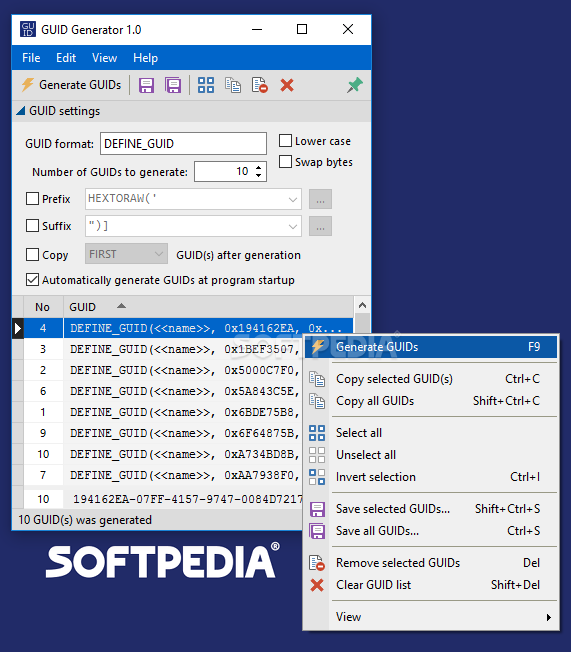
If you want to generate a UUID value solely based on random numbers, you can use the uuid_generate_v4() function. (1 row) UUID value generated from the uuid_generate_v1 function. In this example, the function generated the following UUID value: uuid_generate_v1 To generate the UUID values based on the combination of the computer’s MAC address, current timestamp, and a random value, you use the uuid_generate_v1() function: SELECT uuid_generate_v1() The IF NOT EXISTS clause allows you to avoid re-installing the module.

#UUID GENERATOR ONLINE INSTALL#
To install the uuid-ossp module, you use the CREATE EXTENSION statement as follows: CREATE EXTENSION IF NOT EXISTS "uuid-ossp" Installing the uuid-ossp module. The uuid-ossp module, for example, has various useful methods that implement common UUID generation techniques. Instead, it relies on third-party modules that create UUIDs using specified techniques.
#UUID GENERATOR ONLINE HOW TO#
How to generate UUIDS in Postgres Method 1: Using the uuid-ossp moduleĪs mentioned above, PostgreSQL allows you to store and compare UUID values, but it doesn't have any built-in methods for creating them. This is why this post was developed - to show you several ways to generate UUIDS in Postgres. PostgreSQL allows you to store and compare UUID values, but it doesn't have any built-in methods for creating them. Why doesn't Postgres generate UUIDs itself? Because no one technique is perfectly suited for every application, PostgreSQL has storage and comparison functions for UUIDs, but no function for generating UUIDs in the core database. You may need to produce a UUID if your table has a UUID column. The uuid column data type in Postgres supports globally unique identifiers (UUIDs). Independent systems using UUIDs can be securely combined at any moment without fear of colliding. Separate computers can produce UUIDs at the same time without communicating, and the UUIDs will be guaranteed to be unique.
#UUID GENERATOR ONLINE SERIAL#
UUIDs are a combination of 36-character sequences of numbers, letters, and dashes that are intended to be globally unique.īecause of this fantastic characteristic, UUIDs are frequently used in distributed systems, since it ensures more uniqueness than the SERIAL data type, which creates only unique entries inside a single database. A UUID is a series of lower-case hexadecimal digits separated by hyphens. UUID stands for Universal Unique Identifier, defined by RFC 4122 and other related standards. In this article, you'll learn about the PostgreSQL UUID data type and how to generate UUID values with examples utilizing various functions and modules.

Instead, it relies on third-party modules to create UUIDs using specified techniques. Unfortunately, while PostgreSQL is great for storing and comparing UUID data, it lacks capabilities for creating UUID values in its core.

Because it is completely ACID-compliant and provides transaction isolation and snapshots, many applications are using Postgres these days. Postgres performs better than some other databases because it supports concurrent write operations without the need of read/write locks.


 0 kommentar(er)
0 kommentar(er)
